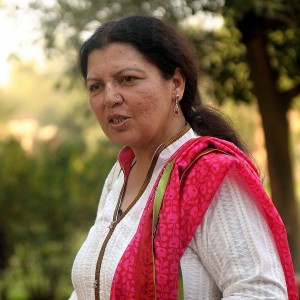A noted historian, a popular author, an active orator, and an influential columnist – the name Rana Safvi needs no introduction. Safvi’s passion for culture and heritage is known to history aficionados. A Master in Medieval History from the prominent Centre for Advanced Studies, Dept. of History, AMU, Rana is a firm believer in ‘Ganga Jamuni Tehzeeb’ – a culture born from the blend of different ethnic, cultural and religious communities.
Also an avid researcher, Rana loves to share knowledge and thus, she founded the well-liked platform, #shair. Credited for reviving popular interest in Urdu poetry, Rana believes #shair is much greater than even her wildest dreams and has become a generic name for Urdu poetry on Twitter.
Safvi’s book, ‘Where Stones Speak: Historical Trails in Mehrauli, The first city of Delhi’ is a unique blend of historical facts and haunting Urdu verse. Even after being a Muslim, Rana never shied away from voicing her opinion even on controversial issues like triple talaq.
In an exclusive interview to Newsd, Rana spoke about many things including her journey, passion, culture, history, heritage, modernity and much more.
Rana’s love and affection towards the capital city are not hidden. “Though I lived in Delhi’s neighbouring state for most of my life I treated Delhi only as a transit place and was always busy with relatives whenever I came here. It’s only in 2010 when my daughter started living here that Delhi became a destination in itself for me,” said Rana.
And it was during a walk that her romance with the city started. “I had got in touch with a few heritage enthusiasts on Twitter and on one of my visits from Dubai I went for my first walk with Asif Khan Dehlvi’s Delhi Karavan. As we walked through Delhi’s first city Lal Kot and Mehrauli, I was smitten and knew I’d found my ‘karm bhoomi’!”
Her writing started once she realised there was a huge gap in the popular stories and the actual history of Delhi.
Rana, on several occasions, had mentioned that she is a firm believer of ‘Ganga Jamuni Tehzeeb’. When asked how she would espouse the idea in today’s India, the noted historian said, “In school, I read the phrase unity in diversity in my textbooks. This diversity came from the years of migration to the fertile plains of India of people from different countries in Asia, whether as traders or invaders, or scholars, artists, artisans fleeing prosecution in their native countries.
The coming together of all these different ethnic, cultural and religious communities, which resulted in ‘The Wonder that is India,’ it gave rise to a unique culture called Ganga Jamuni tehzeeb. These communities while cherishing and preserving their own cultural, religious identities participated and shared freely and spontaneously in the customs and cultural activities of the other communities.
We have to facilitate and preserve the distinctiveness of these communities and yet integrate them in the society at large. There should be togetherness not othering of all communities.
Since she is very much fond of Delhi’s heritages, when asked, is enough being done to conserve and promote Delhi’s legacy, she said “In Delhi, there are a lot of organizations which are working towards it but these are limited to the more famous built heritage or popular festivals. We need to do much more for lesser known monuments which are disintegrating and art and music which is disappearing. For example art of calligraphy.”
Rana believes everything should evolve with time or else it will die. Stagnant pools breed disease, not life; and culture is no different. While preserving its ancient heritage we have to adapt and adopt modern methods to take it forward and keep it relevant for the youth, she feels.
Rana also expressed her views on the claims that western culture is influencing Indian youth saying, “There’s no harm in accepting the western influences in our lives. We have to move with the times. After all, I’m writing this in English and not Urdu! But we must not forsake our own cultural practises, for the western ones. Both together add more value to our lives.”
The famed author thinks it is true that history has been tailored from time to time to suit some particular narrative.
“Post-1857 when the British realised the biggest hurdle to their Imperial dreams was the Hindu-Muslim unity they adopted the policy of divide and rule. Colonial history was written to show British as saviour and the Mughals and Delhi Sultans as the tyrants who only oppressed.
Left historians wrote history from the economic point of view. Right historians now write from the prism of religion and everything is given religious overtones. History is always written by the victory and is mostly biased in favour of the narrative the ruler wants to be propagated.”
Rana also shares one of the biggest historical myths she has come across and it is quite shocking.
“The myth of Jodha Bai. Akbar’s Rajput wife was named Harka Bai and was from Amer, not Jodhpur and given title if Mariam uz Zamani. Jahangir had a wife named Jodh Bai. Yet we have had two major movies on it!”
As we know that Rana is very vocal about triple talaq. When asked being a Muslim what is her take on the whole triple talaq debate that’s going on currently she said: “I am completely against instant triple talaq. It has no section in the Quran or Islam. A rule made during the caliphate of the third caliphate to protect women has been subverted into becoming the biggest tool of pain and harassment of women. It should be abolished as it has been in most Islamic countries.”
Talking about her work and book, she said, “My new book, Tales from the Quran and Hadith, is a fresh retelling of Islam’s greatest stories. These are just stories told as stories with no preaching or moral at the end. If it makes the reader rethink or even just think I’ve achieved my purpose. We confuse Muslims with Islam and I hope this book spurs them to read further and find that out for themselves.”


















